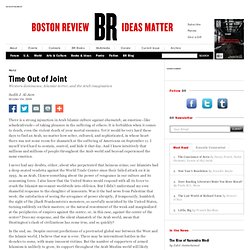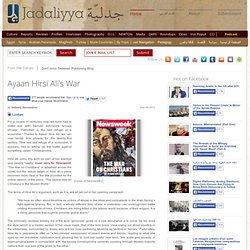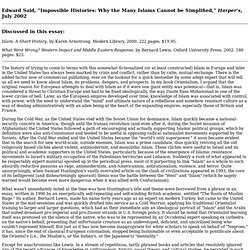

Leave religion out of it.
The Clash of Civilisations and the War on Terror(ists): An Imperialist Discourse - Centre for World Dialogue. Mark B.

Salter teaches in the Department of Political Science at the University of Ottawa. His most recent book is Rights of Passage: The Passport in International Relations (Lynne Rienner, 2003). T he 11 September 2001 attacks on America triggered the US “war against terror”. Jay Rubenstein: Clash of Civilizations or Nuisance? Medieval Crusading and the War on Terror. As the never-ending war on terror enters its second decade, commentators and opinion continue to seek insight from the medieval crusades, when European Christian armies marched to the Middle East to make war against Muslim adversaries. To the casual observer, the crusades would seem to be the origin of all today's problems.
Simply put, they look too much alike to be a coincidence. To the cautious historian, these medieval wars have nothing to do with modern jihad or with the Western response to it and their opinions have tended to shape the broader discussion. But maybe my colleagues are too cautious. The Clash of Ignorance. Labels like "Islam" and "the West" serve only to confuse us about a disorderly reality.

The biggest threat to Western values. The paranoid style in politics often imagines unlikely alliances that coalesce into an overwhelming threat that must be countered by all necessary means.

In Clash of Civilizations, Samuel Huntington conjured an amalgamated East - an alliance between "Confucian" and "Islamic" powers - that would challenge the West for world dominance. Sadik J. Al-Azm: Time Out of Joint. There is a strong injunction in Arab Islamic culture against shamateh, an emotion—like schadenfreude—of taking pleasure in the suffering of others.

It is forbidden when it comes to death, even the violent death of your mortal enemies. Yet it would be very hard these days to find an Arab, no matter how sober, cultured, and sophisticated, in whose heart there was not some room for shamateh at the suffering of Americans on September 11. I myself tried hard to contain, control, and hide it that day. And I knew intuitively that millions and millions of people throughout the Arab world and beyond experienced the same emotion. I never had any doubts, either, about who perpetrated that heinous crime; our Islamists had a deep-seated vendetta against the World Trade Center since their failed attack on it in 1993.
Ayaan Hirsi Ali:The Global War on Christians in the Muslim World. Is this how Newsweek hopes to get raised from the dead? Ayaan Hirsi Ali's War. For a couple of centuries now, we have had to make due with Samuel Johnson’s famous phrase: “Patriotism is the last refuge of a scoundrel.”

Thanks to Ayaan Hirsi Ali, we can now revise this phrase for the twenty-first century. Tthe last last refuge of a scoundrel, it appears, lies in taking up the battle against something called “Christophobia.” Hirsi Ali coins this term as part of her alarmist and deeply hateful cover story for Newsweek. Hirsi Ali, Berman, and Ramadan on Islam. Was the prophet Muhammad a pervert and a tyrant?

Does Islam promote terrorism and enslave women? Does Islam oblige its followers to wage jihad on Westerners whose roots lie in the secular Enlightenment? Should Muslims consider converting to Christianity? For the Somali-born writer Ayaan Hirsi Ali, the answer to all these questions is a resounding “Yes!” Comment: The Attack on “All-American Muslim” Dearborn, Michigan, is the city in America with the highest proportion of Muslims.

That is not a new development. Immigrants from the Middle East began arriving in the area generations ago, when jobs building cars were still a lure—which should give a sense of the community’s vintage. Raymond Ibrahim vs. Hamid Dabashi part 1 of 7. Lawrence Wright: “Islam and the West have clashed in the past and have not clashed. There is nothing inevitable about it.” John Calvert on Sayyid Qutb. The Clash of Civilizations? - Programmes. Edward Said, "Impossible Histories: Why the Many Islams Cannot be Simplified," Harper's, July 2002.
Edward Said, "Impossible Histories: Why the Many Islams Cannot be Simplified," Harper's, July 2002 Discussed in this essay: Islam: A Short History, by Karen Armstrong.

Modern Library, 2000. 222 pages. $19.95. What Went Wrong? Western Impact and Middle Eastern Response, by Bernard Lewis. The history of trying to come to terms with this somewhat fictionalized (or at least constructed) Islam in Europe and later in the United States has always been marked by crisis and conflict, rather than by calm, mutual exchange. During the Cold War, as the United States vied with the Soviet Union for dominance, Islam quickly became a national-security concern in America, though until the Iranian revolution (and even after it, during the Soviet invasion of Afghanistan) the United States followed a path of encouraging and actually supporting Islamic political groups, which by definition were also anti-Communist and tended to be useful in opposing radical nationalist movements supported by the Soviets. From H Levant Editor Subject Cole On.